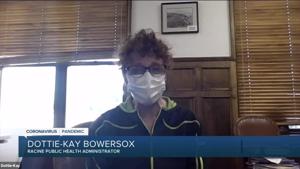Split Wisconsin Supreme Court battles over ‘feckless’ ruling in Racine schools case

(The Center Square) – The ruling that once again says local public health managers in Wisconsin do not have the power to order schools closed also reveals a growing split on the Wisconsin Supreme Court.
The court on Friday ruled that Racine Public Health Officer Dottie Kay Bowersox exceeded her authority in ordering the city’s schools closed back in November of last year.
But it’s what the court didn’t rule on that makes the ruling interesting.
The Supreme Court issued a temporary injunction last November against Bowersox’s closure order. Immediately after that, she changed her order to reflect the city’s public health ordinance and thereby kept the schools closed.
The Wisconsin Institute for Law and Liberty and parents sued Bowersox, wanting her held in contempt for what they playing games with the court’s order. Friday’s decision shot down that request.
Justice Rebecca Bradley provided bullet points in her opinion as to why she considers the majority opinion wrong.
“Troublingly, the constitution plays no part in the majority’s decision to deny petitioners’ Emergency Motion. In this order, the majority declares that ‘[a]llowing petitioners to add claims and parties related to the Safer Racine Ordinance would materially change the scope of this original action proceeding and would take the litigation beyond what we reasonably anticipated when we granted the original action petition.’ So what?,” Bradley wrote in her sharp concurrence. “It is not the petitioners’ fault that Bowersox elected to defy this court’s order enjoining her from closing schools.”
Bradley wasn’t finished. She then chastised other justices for their continued avoidance of bigger questions at the heart of many cases that come before the court.
“The people of Wisconsin deserve to have these monumental issues of statewide significance heard and decided by the state’s highest court. Instead, the majority’s order denying petitioners’ Motion disregards the constitution altogether.,” Bradley added. “Among other consequences, the majority’s apathy caused petitioners to suffer the very irreparable harm the court’s injunction was entered to prevent, and more broadly signals to litigants that they may defy this court’s orders with no reaction whatsoever from the court. The majority thereby harms the court’s institutional authority, rendering it a feckless body unwilling to enforce its own orders.”
Writing in concurrence with the majority, Justice Rebecca Dallet noted: “Nowhere in Bowersox’s briefs, motions, letters, or other filings with the court has she suggested that ‘a local ordinance can override state law.’ Nor did Bowersox — or anyone else — attempt to enforce the November 12, 2020 school closure order after we enjoined that order,” liberal . “Only by reshaping the facts of this case can the separate writings conclude that Bowersox should be held in contempt, or that a contempt hearing is even necessary.”
In recent months the Wisconsin Supreme Court has avoided answering key questions in several election-related cases that have come before the court. Leaving questions as to just what Wisconsin’s election says, and who will enforce it.
Disclaimer: This content is distributed by The Center Square
